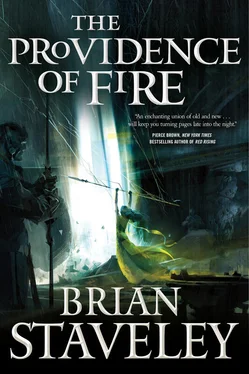Brian Staveley - The Providence of Fire
Здесь есть возможность читать онлайн «Brian Staveley - The Providence of Fire» весь текст электронной книги совершенно бесплатно (целиком полную версию без сокращений). В некоторых случаях можно слушать аудио, скачать через торрент в формате fb2 и присутствует краткое содержание. Год выпуска: 0101, ISBN: 0101, Издательство: Tom Doherty Associates, Жанр: Фэнтези, на английском языке. Описание произведения, (предисловие) а так же отзывы посетителей доступны на портале библиотеки ЛибКат.
- Название:The Providence of Fire
- Автор:
- Издательство:Tom Doherty Associates
- Жанр:
- Год:0101
- ISBN:9781466828445
- Рейтинг книги:4 / 5. Голосов: 1
-
Избранное:Добавить в избранное
- Отзывы:
-
Ваша оценка:
- 80
- 1
- 2
- 3
- 4
- 5
The Providence of Fire: краткое содержание, описание и аннотация
Предлагаем к чтению аннотацию, описание, краткое содержание или предисловие (зависит от того, что написал сам автор книги «The Providence of Fire»). Если вы не нашли необходимую информацию о книге — напишите в комментариях, мы постараемся отыскать её.
The Providence of Fire — читать онлайн бесплатно полную книгу (весь текст) целиком
Ниже представлен текст книги, разбитый по страницам. Система сохранения места последней прочитанной страницы, позволяет с удобством читать онлайн бесплатно книгу «The Providence of Fire», без необходимости каждый раз заново искать на чём Вы остановились. Поставьте закладку, и сможете в любой момент перейти на страницу, на которой закончили чтение.
Интервал:
Закладка:
Because of me, Adare thought, feeling awed and sick at the same time.
Uinian’s disgrace had seemed like a perfect opportunity to geld the Church of Intarra, to seize back the rights and allowances so foolishly granted hundreds of years earlier by Santun III, to recapture decades of lost revenue, and perhaps most importantly, to cripple the power of the Sons of Flame. With il Tornja’s backing, she had moved quickly, drafting up the Accords of Union over the course of two days and two sleepless nights, then shoving them through the various ministries.
On the surface it looked like a fair deal, even a magnanimous one on the part of the Unhewn Throne; after all, the Chief Priest of Intarra had murdered the Emperor-or so everyone believed. The Accords offered a gracious reconciliation between Intarra’s faithful and the larger empire of which they were a part, including a seemingly massive gift to the Church, ten thousand golden suns, “to greater glorify the goddess and her servants.” Il Tornja, in his role as regent, had placed the golden amice on the stooped shoulders of the new Chief Priest himself.
It was all a sham, of course. To be sure, ten thousand suns would widen the eyes of most merchants, but the figure was less than a rounding error for the Ministry of Finance, a meager pittance compared with the amount the throne would claw back every year by reinstating taxation on Church rents and tithes. The glorification of the main temple on the Godsway was only a distraction from the forced shuttering of the smaller temples spread throughout the city. And the Imperial Blessing, that newly instituted ritual in which the Emperor would give his formal sanction to the Chief Priest, required the priest to kneel in supplication before the entire court. The rankest scribe in the Dawn Palace saw the Accords for what they were, but then, Adare hadn’t written the measures to mollify the throne’s scribes; if she could convince the common folk of Annur, the petty merchants and laborers, the fishermen and farmers, that the Unhewn Throne continued to support the Church of Intarra, then she could have her triumph while avoiding a backlash from those eager to scream religious persecution.
It almost worked. The new Chief Priest, Cherrel, third of that name, was a weak, watery-eyed, bookish man. Devout, but utterly lacking in the sort of political savvy and ambition that had made Uinian so dangerous. He had caviled momentarily at one or two of Adare’s demands before caving utterly, obviously relieved that his Church was not to be scrubbed from the streets. According to the observers Adare had placed inside the temple, Cherrel counseled his flock on personal purity and political obedience, counsel they may well have heeded had Adare herself not overreached.
The problem, as always, was the Church’s private army. As long as the Chief Priest, any Chief Priest, was permitted to keep thousands of men-soldiers both well trained and well paid-under arms within the borders of the empire, within the borders of the ’Kent-kissing capital, all the genuflection in the world wouldn’t lead to true submission. The Sons of Flame needed to be disbanded, and so Adare had drafted the edict disbanding them, allowing only one hundred for “the immediate protection of the temple and the greater glory of Intarra.” It had seemed a prudent step, a necessary step, and yet she had not considered the consequences.
Many soldiers found difficulty in returning to civilian life, and the Sons of Flame were no different. In fact, they were worse, their martial experience compounded by single-minded religious fervor. In drafting the Accords, Adare had hoped the Sons would simply melt away-join the bakers’ guild, or ship out with a fishing fleet. It was idiocy, in retrospect. Her father would have recognized the problem, would have avoided it, but her father was dead, and if she didn’t clean up her own mess, it would soon start to stink.
There was no outright rebellion. In fact, it seemed at first that the Sons of Flame had simply drifted off, dissipated, like smoke before a stiff breeze. Then Adare received the first reports from her tax collectors on the road to Olon: the soldiers were headed south. Not in a single group, to be sure. Not marching down the road in rank and column. Had they been so bold, she could have sent the legions after them for defying the terms of the Accords.
No, the Sons of Flame were moving south in a nebulous body-half a dozen here, two or three there, retaining their armor and weapons while discarding the banners and uniforms. Hundreds and hundreds of men like Lehav, leaving Annur. Evidently one of the bastards, a man she’d never heard of, named Vestan Ameredad, was behind it all, urging the men to regroup quietly in Olon, the ancient seat of Intarra and the site of her first temple, to leave Annur for a holier city farther from the grasping claws of the Malkeenians. The exodus of soldiers seemed to have kindled similar sentiment in the more devout civilians as well. Hence the weekly caravans to the south.
It was a disaster, Adare thought, staring at the crowd pressed around her, a disaster for those leaving their homes and for the empire itself. She had incited something perilously close to open rebellion in the very streets of the capital.
And the irony, she thought grimly, is that without this ’Kent-kissing rebellion I’d have no stones left to play against Ran.
What she was planning felt like madness, a desperate gambit to leverage the instability of the empire itself in order to reclaim the Unhewn Throne for her family, and yet it wasn’t really the end of the Malkeenian line that worried her. Despite her own eyes, Adare had no illusions about Malkeenian sanctity. Over the centuries, her family had furnished dozens of emperors, some capable, some less so. The idea of leaving the empire to il Tornja, however … that seemed both a dangerous and cowardly course.
The sedition of the Church of Intarra, dangerous as it might prove, was predictable, comprehensible. The Intarrans, like dozens of religious sects before them, wanted power. They resented the encroachment of secular government into those spheres of life they deemed holy, and they deemed everything holy. It was an old story and a familiar one, almost comforting beside the mysteries of il Tornja’s coup.
Adare had no idea why the kenarang had murdered her father, no idea what he intended toward her, no idea if he had already killed her brothers, no idea what he planned for the empire. She’d been over and over the matter, coming at it from every conceivable angle, but there just wasn’t enough information. It was possible that il Tornja was some sort of foreign spy, that he had been suborned by Anthera or Freeport or the Manjari Empire. Maybe he was acting alone. Perhaps he wanted to destroy the empire or maybe he just wanted to milk it for his own material gain. There was just no way to know.
Her ignorance was infuriating, but as her father had said many times over, Often there is no good path. That does not mean we should not walk.
In the end, Adare kept circling back to the same basic point: the Church of Intarra, so recently her deadly foe, could well prove the salvation, not just of the Malkeenians, but of Annur itself. Only the Sons of Flame had the training and the numbers to pose a plausible threat to il Tornja. If she could bring them under her aegis, if she could incite them to turn against the regent, she would have a ready-made army of her own. If. The word was like a knife pressed against her throat.
This, however, was not the time to flinch. She was committed now, had been since she fled her own guardsmen, which meant going south, meeting with Vestan Ameredad, humbling herself, admitting her error with Uinian, then trying to piece back together an army she had done everything in her power to destroy. The only good thing about the situation was that the outflow of pilgrims to Olon gave her the cover necessary to hide her flight from the city.
Читать дальшеИнтервал:
Закладка:
Похожие книги на «The Providence of Fire»
Представляем Вашему вниманию похожие книги на «The Providence of Fire» списком для выбора. Мы отобрали схожую по названию и смыслу литературу в надежде предоставить читателям больше вариантов отыскать новые, интересные, ещё непрочитанные произведения.
Обсуждение, отзывы о книге «The Providence of Fire» и просто собственные мнения читателей. Оставьте ваши комментарии, напишите, что Вы думаете о произведении, его смысле или главных героях. Укажите что конкретно понравилось, а что нет, и почему Вы так считаете.












